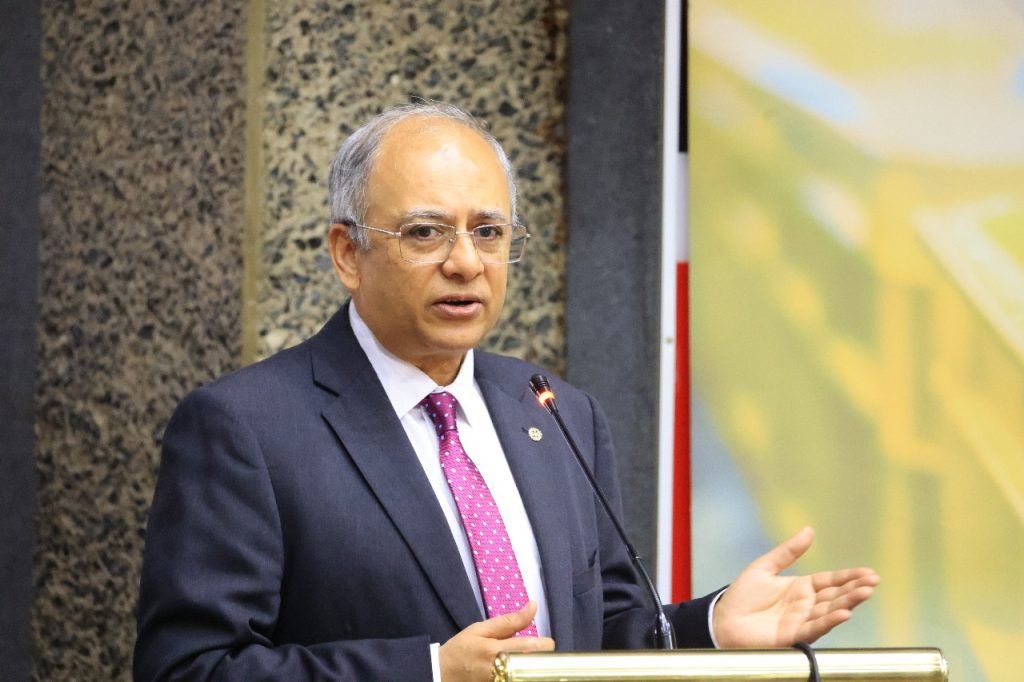Bʏ Mᴀʀʏ Mᴡᴇɴᴅᴇ
October 30, 2025

The 5th National Agribusiness Summit held in Nairobi was marked by candid policy appeals, and renewed optimism for Kenya’s agricultural transformation. The event, organized by the Agriculture Sector Network (ASNET), brought together top government officials, diplomats, and private sector leaders, reaffirming the crucial partnership between government and industry in driving Kenya’s agricultural competitiveness.
While addressing the attendees of the summit, Dr. Bimal Kantaria, chairman of ASNET, underscored the increasingly close collaboration between ASNET and the Ministry of Agriculture and Livestock Development, crediting this partnership for tangible progress, including the fertilizer subsidy program, which has lowered input costs and increased productivity for farmers nationwide. “Farmers are now getting cheaper fertilizer, and local blenders like myself are supplying through the National Cereals and Produce Board. It’s working relatively well,” he said.
However, he added that the government should consider expanding the subsidy basket to include lime, soil conditioners, and veterinary products under the same e-voucher system. “The same money, just a broader basket of inputs, it’s a simple but impactful change,” he noted.
New Trade Barriers Threaten Export Competitiveness
Despite the progress, Dr. Kantaria cautioned that several emerging regulatory costs were undermining Kenya’s export competitiveness, especially for small-scale farmers and agribusinesses. Among them was a $10 export levy per consignment imposed by KenTrade, the national trade facilitation agency.
“Even if you’re exporting a small box of mangoes, you’re charged ten dollars,” he said. “For a farm exporting 40 consignments a day, that’s over KSh 50,000 daily.”
He reminded the audience that President William Ruto had previously agreed to reduce the levy from $10 to KSh 300 (approximately $2) following consultations at the Presidential Roundtable, and appealed to the Prime Cabinet Secretary to ensure that this directive is implemented urgently.
Unlocking Flower Value Chains through VAT Reforms
Another pressing concern raised was the 16% VAT charge on transactions between small-scale flower growers and large exporters. Dr. Kantaria explained that this tax has discouraged large farms from buying flowers from smaller outgrowers because VAT refunds are slow and uncertain.
“The result is that big exporters are no longer consolidating flowers from small farmers, which hurts inclusivity and value chain integration,” he said.
ASNET is now lobbying for these inter-trade transactions to be zero-rated, enabling seamless trade between growers and exporters.
Expanding Kenya’s Export Markets
The ASNET chair commended the government’s efforts to open new international markets, citing China’s decision to grant duty-free access to Kenyan agricultural products as a major milestone.
“We hope your office can encourage the Ministry of Trade to start bilateral negotiations with India and Turkey, to reduce tariffs on Kenyan exports like flowers, tea, and coffee,” he urged Mudavadi.
He highlighted ongoing collaboration with Trade PS Alfred K’Ombudo, noting that while progress has been made, “agriculture must be placed higher on the negotiation agenda” if Kenya is to diversify its export markets and reduce dependence on the EU.
The summit also drew international attention, with several diplomats attending, including Ukraine’s Ambassador to Kenya, Mr. Yurii Pyvovarov, and French Embassy representative Martin Parent.
The 5th National Agribusiness Summit 2025 closed on a note of cautious optimism and renewed collaboration. “Together,” Dr. Kantaria said, “we can turn Kenya’s agricultural sector into a globally competitive powerhouse that delivers real wealth, real jobs, and real change for our people.”
